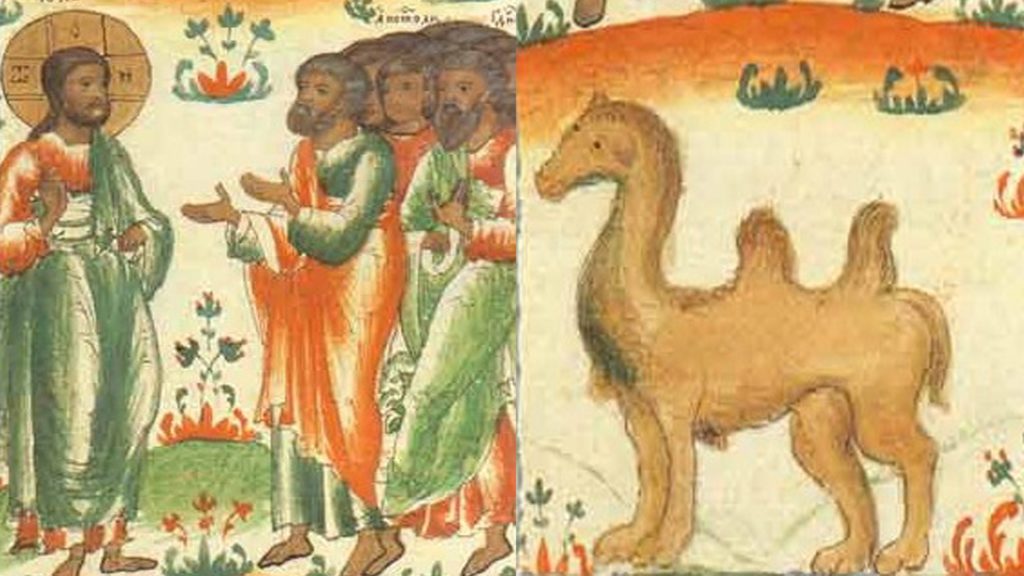HEIRS OF ETERNAL LIFE
Mark 10:17-31
Twenty-First Sunday after Pentecost
Analysis by Fred Niedner
17 As he was setting out on a journey, a man ran up and knelt before him, and asked him, “Good Teacher, what must I do to inherit eternal life?” 18 Jesus said to him, “Why do you call me good? No one is good but God alone. 19 You know the commandments: ‘You shall not murder; You shall not commit adultery; You shall not steal; You shall not bear false witness; You shall not defraud; Honor your father and mother.'” 20 He said to him, “Teacher, I have kept all these since my youth.” 21 Jesus, looking at him, loved him and said, “You lack one thing; go, sell what you own, and give the money to the poor, and you will have treasure in heaven; then come, follow me.” 22 When he heard this, he was shocked and went away grieving, for he had many possessions.
23 Then Jesus looked around and said to his disciples, “How hard it will be for those who have wealth to enter the kingdom of God!” 24 And the disciples were perplexed at these words. But Jesus said to them again, “Children, how hard it is to enter the kingdom of God! 25 It is easier for a camel to go through the eye of a needle than for someone who is rich to enter the kingdom of God.” 26 They were greatly astounded and said to one another, “Then who can be saved?” 27 Jesus looked at them and said, “For mortals it is impossible, but not for God; for God all things are possible.”
28 Peter began to say to him, “Look, we have left everything and followed you.” 29 Jesus said, “Truly I tell you, there is no one who has left house or brothers or sisters or mother or father or children or fields, for my sake and for the sake of the good news, 30 who will not receive a hundredfold now in this age—houses, brothers and sisters, mothers and children, and fields with persecutions—and in the age to come eternal life. 31 But many who are first will be last, and the last will be first.”
DIAGNOSIS: Trying to Earn an Inheritance
Step 1: Initial Diagnosis (External Problem): I’ve Been Good!
Among the few things we cherish more than whatever wealth we have stashed away or the stuff we have bought with it, is the notion that we have earned it all and thus deserve everything we have, along with the place in the world’s pecking order that our investment portfolio, however modest, guarantees us. Although we can summon up a bit of sympathy for those who have never had anything, or those who once thrived as we have but later managed to fall into poverty, we silently rubberneck them, like we do highway accident victims, and ask, “What wrong turn did they take (that we didn’t)? What warning signs (that we made sure to heed) did they ignore?”
Like the ballplayers who point triumphantly to the heavens when they score or win, we also trust our successes as signs of God’s favor. Yes, we know that “the Lord helps those who help themselves” isn’t really in the Bible like some folks think. Truth be told, however, it’s part of our unwritten canon, and some echo or midrash on this maxim comes to mind each time we must politely circumvent beggars outside the stations, stadiums, and theaters we frequent, or ignore folks inside who once traveled in our circles but have somehow lost their way and place in the world: “There but for all my faithful efforts and God’s righteous scorekeeping go I.” “Jesus loves me, this I know. My perfect report card tells me so.” Right, Jesus? You of all people know good when you see it. Won’t you check my report card for me and assure me I’m on the list for the Good Place?
Step 2: Advanced Diagnosis (Internal Problem): Caught Cheating
Jesus obliges and ticks off categories on the evaluation list. No murder? Check. No adultery? Check. No stealing? Check. No lying in court? Check. No subtle, sneaky fraud by which you end up with what someone else deserves?
WAIT! STOP! That’s not one of the commandments! You’re cheating, Jesus, by slipping in a ringer commandment like that. And yet, come to think of it, in our heart of hearts we know that this same tactic is precisely how we have tripped up others and walked away with what they forfeited because they didn’t read the fine print—some quaint, old restriction deep in the maze of Leviticus or Deuteronomy. Even if we didn’t do this ourselves, not directly anyway, we have some of what we have because nearly everything we purchase in our complex economy we can afford because someone we’ll never know got defrauded of their labor’s just value. And our retirement plans all reek of fraud, although we can’t smell it online when we log into our accounts. There’s nothing we can do about that, Jesus. It’s “the system.” So, we give ourselves a check in this category, too. No fraud! We’re clean. Clean enough. Clean as anyone can be. (And when we read about ourselves later in Mark’s story, we are not surprised to discover that Jesus’ in-group, the disciples, cooked their books, too, claiming the abandonment of homes, property, and family members as special deductions on their compliance reports. They’re good!)
“Great!” Jesus says. “Then sell all you have. Give it away to the poor and (gulp) undeserving. That’s the last check mark you need. Then come, follow me on the journey I was just starting when you interrupted me with your craving for approval and assurance.” The shock and darkness on our faces and the ache in our hearts comes from seeing ourselves as nothing, nobody, without our possessions and bereft of the affirmation, approval, and place they provide us.
Step 3: Final Diagnosis (Eternal Problem): Through the Needle’s Eye
We’d rather be dead than divested of everything for which we have worked and sacrificed. Moreover, the image or joke Jesus offers those still standing around after we walk away to find our approval elsewhere suggests exactly that. We’d have to become nothing, not merely poor, to get through the eye of a needle. It would kill us. We spend our lives and all we have working to avoid that very thing. Indeed, we work ourselves to death. If it takes forever, we’ll prove we did not deserve to get pulled through that damned needle and die.
PROGNOSIS: The Gift of Eternal Life
Step 4: Initial Prognosis (Eternal Solution): Through the Needle’s Eye—With Him
Jesus doesn’t merely look upon the man in our story, he considers him carefully, and us with him, and he chooses to love him, and us, too. “You need only one more thing, and that’s to come along with me,” says Jesus to the one(s) he loves. Jesus is already on the journey that will take him through the needle’s eye he will mention later, and one way or another we’ll go through the needle’s eye as well, stripped of everything, crying out in emptiness, perhaps shrieking all the way like a camel being sheered of its humps. It will kill us, but God will get us through. And we don’t pass through alone or forgotten. Indeed, we’ve already passed through that narrowest of needle eyes in baptism. We have passed through with him. On the other side, stripped of all we counted on to make us someone, lo, we aren’t nothing or nobody, but his beloved. He knew we were all headed for the needle’s eye anyway, no matter what, and he wanted nothing more than to accompany us, have us as journey companions.
Step 5: Advanced Prognosis (Internal Solution): Stripped, Yet Wealthier than Ever
On this other side of the needle’s eye we have identity, purpose, meaning, and place that neither wealth and stuff nor poverty and no-stuff can grant or take away. We follow Jesus through the needle’s eye and into the kingdom—i.e., into the realm where God has God’s way, where the last are first, and the formerly first are too busy giving thanks for all the new company they have now to complain, or perhaps even to notice. They gave everything away and discovered not only that people like getting your stuff, and maybe like you because of it, but even more delightful is finding oneself among the poor and poor in spirit who have only each other on the way through the needle’s eye (and the whole journey, all four-score-plus years, is passage through the needle’s eye if you know the truth). In this company we have more joy, and more riches worth having, than any corporation board. We are each other’s treasure, and by Jesus’ accounting methods, that’s precisely how you recognize and accumulate “treasure in heaven.”
Step 6: Final Prognosis (External Solution): Last in Line, Still Rejoicing
Here we are, then, at the end of the line, hanging out with those who have nothing but Jesus and each other, which, in Mark’s way of thinking, is precisely how God “rends the heavens and comes down” in answer to old Isaiah’s prayer. You want to see God? Or inherit “eternal life?” Come with us. We have learned the secret. You find or inherit life by losing it, giving it away, and landing in the company of the crucified. We lose it all in the end anyway, of course, just as he did, but when we end up in his company, instead of dead silence and oblivion, we’re gathered into song, his songs, the songs that never end.
The world-wealthy, panting along on the treadmill side of the needle’s eye, hear that strange music and wonder, “What in hell is that?” Exactly, we think, as we look at them, love them, and extend a warm welcome.




You must be logged in to post a comment.